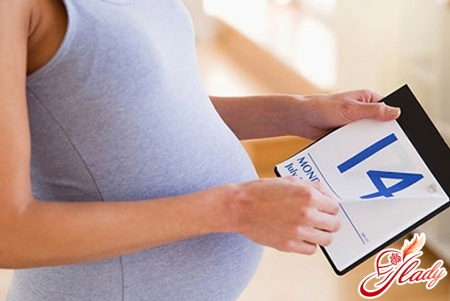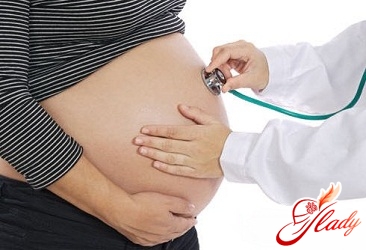 The desire to become a mother is the most natural forany woman. However, a woman is like a beautiful vase - also fragile and requires the most careful attitude to health. There is a huge number of various diseases that can prevent a woman from becoming a mother, since they significantly reduce the likelihood, and at times even exclude pregnancy. And the woman in despair over and over again asks the same question - why can not I get pregnant? Sometimes the cause of infertility are mere trifles, from which modern medicine can save a woman in the shortest time. So, for example, in response to a woman's question about whether you can get pregnant with erosion, the doctor will just smile. After all, he knows how to simply get rid of this problem. The same thing happens in a number of other cases. However, alas, not always the problem of infertility is solved so simply. Some diseases are so serious that women are forced to undergo long and painful treatment, and sometimes even resort to the most radical methods, such as IVF. But in most cases, the diseases that prevent the onset of pregnancy are eliminated without much difficulty, provided timely adequate treatment. Pay special attention to the fact that almost any disease of the female sexual sphere, left unattended by both the woman herself and the doctors and, consequently, in the absence of the necessary treatment, sooner or later can cause the development of secondary infertility. And even in the event that it seems to you that you will never again come to have children, remember that everything in our life is rapidly flowing and changing. And it is quite possible that in a few years you will bitterly regret your hasty decision. This article describes the main diseases that gynecologists talk about in response to a woman's question about why she can not become pregnant. However, remember that all information is provided only for general information and can not serve as a guide to action - independent diagnosis and treatment. Remember that often the symptoms of various diseases can be very similar and, as a consequence, improper treatment can only aggravate the condition of a woman.
The desire to become a mother is the most natural forany woman. However, a woman is like a beautiful vase - also fragile and requires the most careful attitude to health. There is a huge number of various diseases that can prevent a woman from becoming a mother, since they significantly reduce the likelihood, and at times even exclude pregnancy. And the woman in despair over and over again asks the same question - why can not I get pregnant? Sometimes the cause of infertility are mere trifles, from which modern medicine can save a woman in the shortest time. So, for example, in response to a woman's question about whether you can get pregnant with erosion, the doctor will just smile. After all, he knows how to simply get rid of this problem. The same thing happens in a number of other cases. However, alas, not always the problem of infertility is solved so simply. Some diseases are so serious that women are forced to undergo long and painful treatment, and sometimes even resort to the most radical methods, such as IVF. But in most cases, the diseases that prevent the onset of pregnancy are eliminated without much difficulty, provided timely adequate treatment. Pay special attention to the fact that almost any disease of the female sexual sphere, left unattended by both the woman herself and the doctors and, consequently, in the absence of the necessary treatment, sooner or later can cause the development of secondary infertility. And even in the event that it seems to you that you will never again come to have children, remember that everything in our life is rapidly flowing and changing. And it is quite possible that in a few years you will bitterly regret your hasty decision. This article describes the main diseases that gynecologists talk about in response to a woman's question about why she can not become pregnant. However, remember that all information is provided only for general information and can not serve as a guide to action - independent diagnosis and treatment. Remember that often the symptoms of various diseases can be very similar and, as a consequence, improper treatment can only aggravate the condition of a woman.
Thrush
Very often doctors can hear the question,whether it is possible to become pregnant with thrush. Before answering it, it is necessary to outline in general outline to women what is a common disease such as thrush, or, scientifically, candidal vaginitis. This disease affects most often the sexual organs of the girl, however, in very rare cases, the mucous membranes of the oral cavity also suffer. The disease is caused by a pathogen - a Candida fungus. Strictly speaking, this fungus lives in the body of absolutely any woman. But in the event that the immune system of a woman functions properly, the fungus does not multiply. In the same case, if the body of a woman is weakened, and immunity is not able to perform its functions in full, the fungus begins to multiply pathologically quickly. As a result of this process, the normal level of microflora in the vagina is largely disrupted. The woman has the following symptoms:
- Burning and itching in the genital area.
The first and most pronounced symptomvaginal candidiasis is the appearance of a strong sensation of itching and burning in the genital area. Sometimes itching is so intolerant that it leads to the development of a woman's real neurosis. A characteristic feature of pruritus caused by candidiasis is that it is almost impossible to abolish by any methods until the disease worsens.
- Redness of the female genitalia.
Mucous of genital organs with thrush, asthe rule turns red and can swell a little. In the same case, if the inflammatory process involves not only the external genitalia, but also the vagina, a woman can feel painful sensations of varying severity - from mild to strong enough. The woman experiences the greatest discomfort and pain right at the moment of sexual intercourse.
- Discharge from the vagina.
Allocations from the vagina occuralmost any woman. However, if a woman develops a thrush attack, the nature of the vaginal discharge sharply and significantly changes - their number increases many times, they have white color and curdled consistency and have an acidic odor.
- Soreness when urinating.
When a thrush attacks a woman experiencessufficiently severe burning in the genital area during urination. This is due to the fact that urine falls on the affected areas of the vagina. Remember that most often, in 90% of cases, all the symptoms of thrush are actively manifested about a week before the start of menstruation. In addition, heat, in particular a hot bath, increases the feeling of itching and burning. And, of course, the main issue that worries almost all women suffering from thrush is whether it is possible to get pregnant with thrush. Doctors - gynecologists answer this question uniquely - yes, with thrush you can get pregnant. The thrush does not affect the process of maturation of the egg, nor on its fertilization, nor on the implantation of the embryo into the mucous membrane of the uterus. Even more so - often the first time in a woman's life comes across a thrush during pregnancy. This is because during pregnancy, the woman's level of immune system performance is significantly reduced. And quietly - peacefully dormant in the female body mushrooms begin to multiply actively, which leads to the development of thrush. Another very influential aspect that provokes the development of thrush in a pregnant woman is a natural change in the vaginal microflora that arises from a changed hormonal background. In the event that the thrush developed during pregnancy, doctors appoint a future mother a certain course of treatment, aimed at restoring the normal vaginal microflora. However, if a woman suffering from thrush is not pregnant, and only plans to become a mother, she must remember that the fungi of the genus Candida represent a real and serious threat to the health of a newborn baby. At the very moment when the kid makes his first in life way - the way through the mother's birth canals, he gets a set of bacteria. Of which his own microflora will be formed. The most vital bacteria for a newborn baby are lactobacilli, which are responsible for the full absorption of milk and the formation of intestinal microflora. In the same case, if the mother of the baby has a normal microflora disrupted and a large number of Candida fungi are present, the microflora of the baby also becomes pathogenic. The child also in most cases falls ill with thrush. And both the boys and girls suffer from the milkwoman - in newborn babies, the thrush flows on the mucous membranes of the oral cavity, and in girls - also the genital organs. In especially severe cases, thrush can also be localized to the mucous eyes. Remember that the body of newborns is very, very weak - if thrush is not treated, it is possible to develop chronic diseases of the oral cavity and even blindness. Very often pregnant women, having learned that they suffer from thrush, do not consider it necessary to be treated, mistakenly believing that fungi will in any case fall into the uterus to the baby. However, this opinion is fundamentally wrong - fungi can not enter the uterine cavity in any way, since the cervix is securely closed by a dense mucous plug. Therefore, in time getting rid of thrush, a woman provides her baby with an exceptionally beneficial and useful microflora. Treating thrush during pregnancy is completely safe for the baby and does not harm him in any way. Yes, and a healthy, happy mother to a child is much more necessary than an evil and jerky. But the answer to the question whether a thrush prevents a pregnant woman from getting pregnant is not so straightforward: the thrush gives the woman a strong discomfort, including during sexual intercourse. Accordingly, it really is a kind of hindrance for the onset of pregnancy.
Pregnancy in cervical erosion
Another very frequent physician -gynecologists question - whether it is possible to become pregnant if a woman has cervical erosion. Erosion of the cervix occurs in every third of women, so this issue never loses its relevance. What is cervical erosion? In order to understand the answer to this question, we will consider the normal structure of the cervix and those pathological processes that occur in it and ultimately lead to the development of erosive lesions of the mucous membrane of the cervix. What is the uterus knows, probably every woman is a hollow organ, consisting mainly of muscle tissue and lined with mucous epithelium from the inside. Visually, the uterus is very similar to a pear fruit, turned upside down. The uterus and vagina are connected by a channel, which is called the cervix. The cervix, as well as the uterine cavity itself, is lined with a mucous tissue. However, the structure of the mucous membrane of the uterus and cervix is different. Mucous membrane of the cervix on certain days of the menstrual cycle, under the influence of a changing hormonal background, a special cervical mucus is produced. This cervical mucus, strictly speaking, is present permanently in the canal, but its properties are constantly changing - for example, approximately in the middle of the menstrual cycle, the cervical mucus acquires a less viscous and dense consistency than on other days, to facilitate the penetration of the sperm. In the event that there is any provoking factor - about them will be told a little lower, the following pathological process is launched. First, the inflammatory process of the mucous membrane of the cervix begins. Inflammatory process is always accompanied by increased secretion and, accordingly, increased release of leucorrhoea. The excessive amount of vaginal secretion exerts the strongest irritation of an already inflamed epithelium. Very quickly, the epithelium is destroyed - it simply disappears, and erosion occurs in its place. Erosion of the cervix is very sensitive - both to pathogens of various diseases, and to mechanical effects. At the slightest touch to erosion, it immediately begins to bleed - a woman can notice spotting after a sexual act or gynecological examination. Of course, to say that erosion of the cervix almost always causes painful sensations in a woman, especially during intercourse, is not necessary - it is clear and without words. It is this damage to the epithelium of the cervix and is called "true erosion" of the cervix. It is very important to distinguish true erosion from pseudo erosion:
- True erosion always has an irregular shape.
- True erosion always has a bright red color, and no other.
- True erosion always bleeds at the slightest touch to it.
Pay attention to the fact that the true erosionCervical cancer lasts a very short time - only about two to three weeks. After that, the erosion either spontaneously disappears, or flows into a "pseudo erosion" form. As a rule, pseudo erosion is diagnosed by doctors in a woman. 
Causes of erosion
Erosion of the cervix, like any other disease, does not occur simply for no reason. The occurrence of erosion of the cervix often occurs due to the following reasons:
- Various infectious diseases.
Any inflammatory disease, especiallyhaving a chronic course, regardless of its origin, may lead to erosion of the cervix. Such provoking diseases can be: herpes virus, chlamydia, other sexually transmitted diseases. For example, women often wonder if they can get pregnant with ureaplasma. But few people are interested in the consequences of such a pregnancy, because they simply do not take into account the possible complications caused by this disease.
- Early onset of sexual activity.
The final formation of the mucosathe cervix ends at about the age of twenty. And in the event that the sexual life began too early, the process of normal formation is disturbed and erosion is almost impossible to avoid.
- Injuries of the cervix.
Any trauma to the cervix, whatever they are caused. Although most often, of course, the cervix is injured as a result of the birth process or abortion.
- Violation of normal hormonal background.
In the event that in the body of a woman on those orOther reasons are a violation of the normal hormonal background, the amount of secreted secret and its composition change. As already mentioned above, this phenomenon often leads to the development of the first true, and after and pseudo erosion. Concluding the story about the nature of erosion of the cervix, it must be mentioned that she is an exceptionally benign entity that has nothing to do with cancerous tumors. Erosion of the cervix in the circle of physicians has one more name - if you hear the word "ectopia" in the doctor's conversation, know that it is about her. The localization of erosion of the cervix can be very different - it can cover the entire cervix or be located in the area of the internal or external throat of the cervix. Cases of multiple cervical erosions are also common. By the way, its dimensions can also vary very much - from a small point to a huge spot.
Treatment of cervical erosion
Modern medicine allows womenget rid of erosion of the cervix in the shortest possible time and without much effort. There is a huge number of very different methods of getting rid of erosion - you need to describe everything in a separate article. If you describe the principle of treatment in general terms, it will look like this. First of all, the doctor - gynecologist has the task as soon as possible to eliminate the inflammatory process of the cervix. This is done with the help of various pharmacological preparations and appropriate physiotherapeutic treatment. In addition, it is extremely important to correctly establish what exactly triggered the development of cervical erosion and get rid of this disease. Otherwise, relapse of the disease is possible. After the inflammatory process in the cervix is eliminated, the doctor must get rid of pathological tissues. How this is done, the doctor decides, based on an objective assessment of all the features of the course of the disease in each case. It can be cauterization with a laser beam, kreon, pharmacological preparations or an electric current. And, finally, the most important question - is it possible to become pregnant with a woman suffering from cervical erosion? Most often, erosion in itself does not interfere with the onset of pregnancy, since it does not affect either the function of the ovaries or the mucous membrane of the uterus. However, with very much neglected erosion, there are still a number of specific problems related to pregnancy in one way or another:
- Difficult penetration of spermatozoa into the uterine cavity.
As mentioned above, cervical mucus changesits composition depending on the period of the menstrual cycle, becoming more permeable to spermatozoa in its middle. If a woman has a place to have cervical erosion in neglected form, this process can be disturbed, as a result of which penetration of spermatozoa can be difficult.
- Pain in intercourse.
As already mentioned, erosion is extremelysensitive. And so the penetration of the penis can cause a woman extremely painful sensations, in some cases making sexual intercourse and, consequently, conceiving impossible. However, cervical erosion treatment solves this problem very quickly. Very often you can hear about the fact that a woman who has not become pregnant or who is going to become a mother for the second time can not burn the erosion. This prohibition is motivated by the fact that when cauterizing on the cervix of the uterus a scar is formed, which supposedly in subsequent births will interfere with the normal process of opening the cervix during labor. Part of the truth in this statement, of course, is. However, it is much more reasonable to listen to the opinion of your attending physician. First, the doctor is able to adequately and objectively assess the severity of your disease, weigh all the positive and negative aspects of cauterization of cervical erosion, taking into account possible risks and the expected benefits. Believe me, no doctor will harm his patient harm and certainly will not prescribe an operative intervention without acute need. And, secondly, modern medicine allows you to choose exactly the method of eliminating erosion of the cervix, which will be most sparing in a particular case. Whatever it was, but the onset of pregnancy in a healthy woman is much more desirable than that of a person who suffers from any diseases.
Pregnancy in cystitis
Another very often asked question is whetherto become pregnant with cystitis. Of course, the anxiety of women is absolutely understandable and natural, but the doctors question about pregnancy with cystitis causes only a good smile - because any doctor knows about the possibility of becoming pregnant with cystitis. Cystitis doctors call the inflammation of the walls of the bladder, often flowing in its mucous membrane. Cystitis can be attributed to both urological and gynecological diseases. This is because inflammation of the bladder itself is a purely urological disease, whereas the causes of cystitis in the vast majority of cases refer specifically to gynecological diseases. That is why the treatment of cystitis should be comprehensive, both from urologists and gynecologists. Only in this case, a possible complete cure for the disease. The following diseases very often lead to the development of a woman's cystitis, which occur in both acute and chronic forms:
- Various infectious agents, such as staphylococci, streptococci, Escherichia coli and several others.
- Viruses and chlamydias.
- Mushrooms of the genus Candida.
- Inflammation of the bladder due to surgery - in this case, almost always the causative agents of the disease are gram-negative microorganisms.
Women are much more often prone to inflammationurinary bladder than men. This feature is explained very simply - features of the anatomical structure of the urethra: it is much shorter than that of a man. The vagina and anus are located very close to each other, so that infectious agents without any special obstacles penetrate first into the urethra, and from there directly into the bladder itself. So, let's return to the question of whether it is possible to become pregnant if a woman has cystitis. As already mentioned, cystitis alone does not in any way affect the possibility of conception of the child. Nevertheless, there are a number of very important BUT:
- Presence of concomitant disease.
As you already know from the above, cystitismost often is a consequence of various gynecological diseases, including those transmitted sexually. But these same diseases, in turn, can hamper both the onset of conception, and the safe outcome of pregnancy and the birth of a healthy baby. In the event that you suffer from cystitis, and even more so having a chronic form, in no case do not leave it unattended, but consult a doctor. The doctor will help to establish the cause of the inflammatory process in the bladder, and will select the optimal treatment regimen.
- Recurrence of the disease during pregnancy.
Inflammation of the bladder in a pregnant womanis very common. And even more so the aggravation of a woman who is expecting a baby, chronic cystitis. Since the treatment of cystitis is carried out with the help of antibacterial drugs, which, while not causing much harm to the future baby, but still not desirable, it is much more reasonable to treat the disease in advance. Pregnancy after antibiotics is much better than taking them during pregnancy.
Pregnancy with a cyst
Another problem that interests women -Whether it is possible to become pregnant with an ovarian cyst. In order to solve this difficult issue, a woman should seek medical advice from a gynecologist. This question can be divided into two subsections:
- Is pregnancy possible if a woman has an ovarian cyst?
Unambiguous answer to this question can not beThe process of fertilization, subject to the presence of a female cyst affects several different factors. As everyone knows, in the process of the menstrual cycle, maturation occurs and the egg leaves the follicle. If this process is broken for some reason and the egg does not leave the follicle, a cyst develops, which is called - follicular. Such a functional cyst, of course, will prevent further normal growth of the follicles and, as a consequence, the process of ovulation and conception becomes impossible. But if the cysts present in the ovary have a non-follicular nature of origin and in no way interfere with the process of ovulation and fertilization, the onset of pregnancy is possible. However, a woman planning to become pregnant with a dysfunctional ovarian cyst should remember that such pregnancies are a high-risk group, since there is always a risk of a twisting of the cyst leg, which will require immediate surgery. That's why doctors - gynecologists advise to get rid of ovarian cysts before planning a pregnancy. In the same case, if the pregnancy has already occurred, the gynecologist will prescribe a treatment to the woman, which is designed to reduce the risk of developing a torsion of the legs to a possible minimum. Pregnant with the presence of infectious diseases and sexually transmitted diseases. Also very often women ask about whether it is possible to become pregnant with inflammation. The answer to this question will depend on which type of inflammation the woman has, and what exactly causes the inflammation. So, for example, on a question whether it is possible to become pregnant with trichomoniasis, gynecologists will give an ambiguous answer. In the event that the disease did not cause any pathological changes in the woman's reproductive system, theoretically the onset of pregnancy is possible. However, in practice, the decision to become pregnant in such a situation is extremely irresponsible and unreasonable. Pregnancy, taking place against the background of infectious diseases, is very often complicated and often ends very sadly - spontaneous interruption, premature birth or the birth of a sick child. So, for example, the answer to the question of whether it is possible to become pregnant with an endometritis is negative. But complications can not be avoided. Similarly, women are worried about the question - can I get pregnant with colpitis. But few people think about the harm that will be caused to that baby whose mother suffers from this disease. Much more sensible before planning pregnancy to undergo a complete examination of the body and, if necessary, undergo a course of treatment. For an illustrative example, consider one case - chlamydia during pregnancy can affect the development of the fetus during pregnancy, causing a violation of the normal development of the fetus and, as a result, congenital malformations. And if you get pregnant after a clamidiosis, already treated, no complications from health, both mother and fetus will not follow. Summing up the logical result, I would like to mention once again that before planning a pregnancy, a woman must necessarily seek a consultation with a gynecologist and go through all the necessary examinations. However, at least general knowledge about such a delicate problem as infertility will be very useful. We are happy to offer you full and interesting information on this subject that you can find . Remember that - with a huge desire, you can achieve anything, and even more so a clean and bright goal, how to call yourself a mother! We advise you to read:









